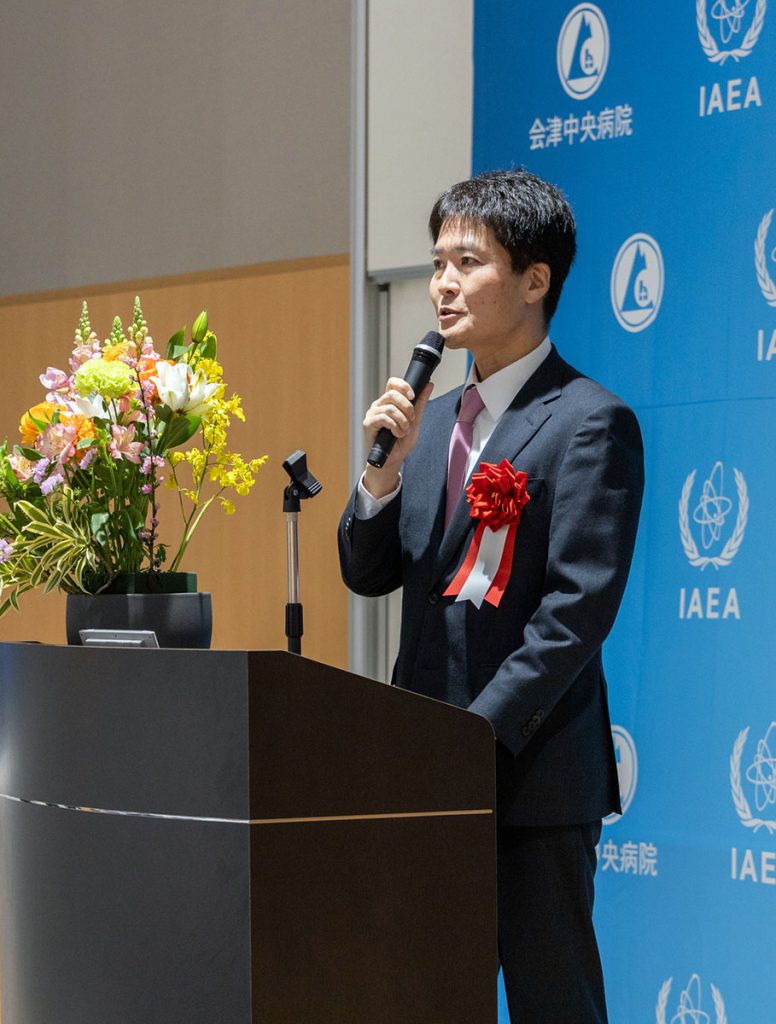IAEA Rays of Hope調印式について
IAEA Rays of Hope調印式

温知会 会津中央病院とIAEAとの間でRays of Hopeの調印式が2024年3月14日、福島県福島市で行われました。会津中央病院からは南 嘉輝 理事長、前田 佳一郎 病院長、IAEAからはグロッシー事務局長が参加し、日本政府代表の方々の出席のもと調印式が開催されました。
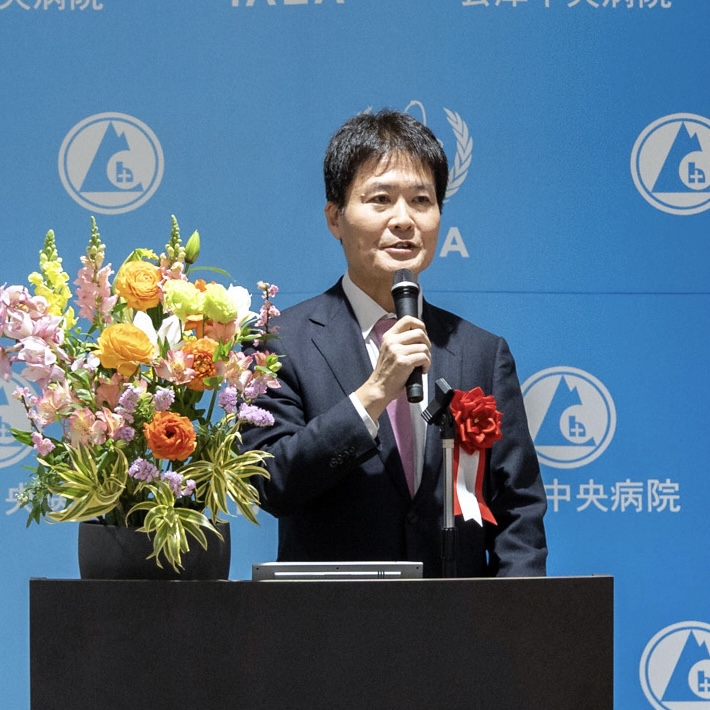
前田病院長
会津中央病院は福島県会津地域の中核として、高度かつ先進的な医療の提供に日々取り組んでいる。救命救急センター、脳卒中センター、循環器病センター、消化器病センター、外傷再建センターなど、多岐にわたる専門センターを擁し、2年前には、すべての人が先進的ながん治療を受けられるようにとの願いから、がん治療センターを新たに立ち上げた。
今回のIAEAに対する寄付は、福島県における原子力災害からの復興支援に対して、IAEAが行ってきた活動に感謝の意を表するととももに、低所得国におけるがんの放射線治療の普及に向けたIAEAの努力に共感したことが主な理由。我々自身もがん治療の質の向上に努めていきたいと述べた。
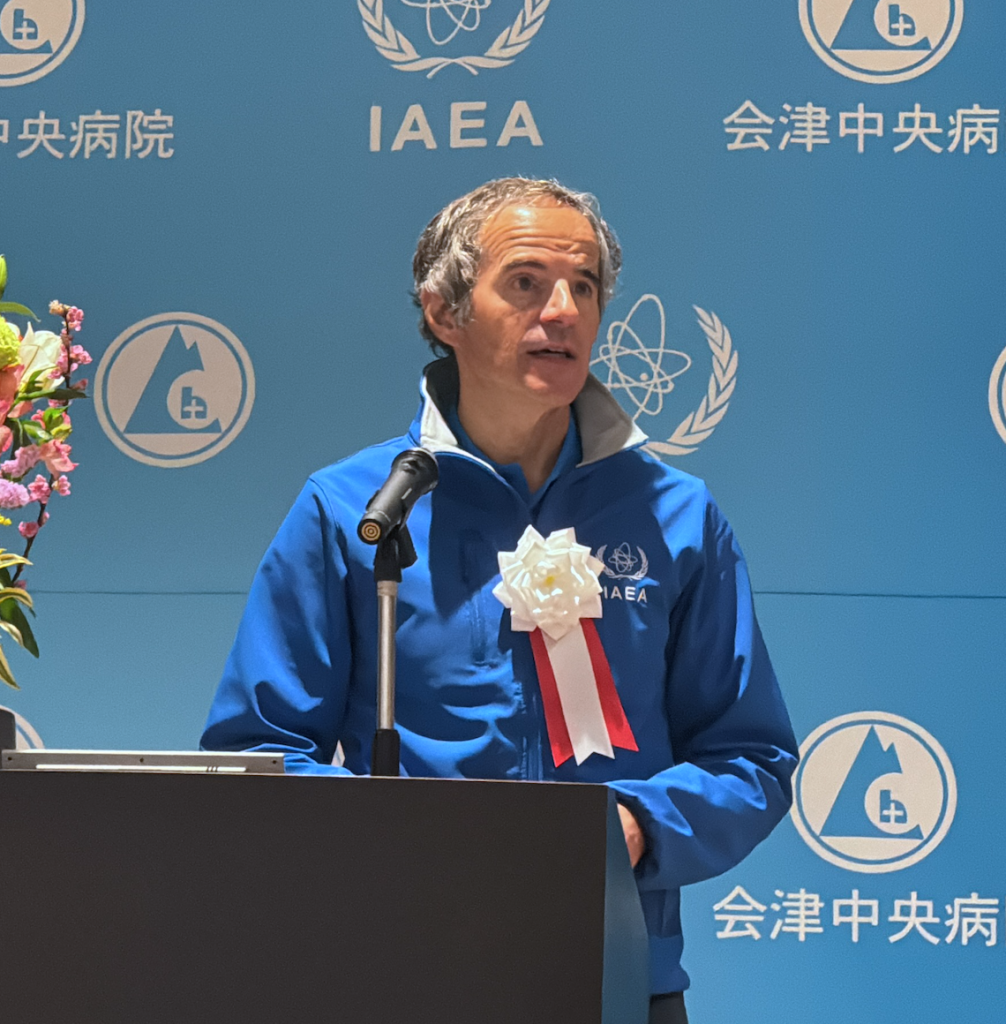
グロッシー事務局長
IAEAは、福島第一原発事故の処理や復興に対し支援し安全という事を協力してきている。今回の訪問理由は、原子力発電所の処理水の確認だけでなく、新しい理由を作ってくれた。日本や世界の人々の人命を救うという「Rays of Hope」の取り組みについて理解・協力してくれるという事は非常に嬉しいことである。IAEAはRays of Hopeで世界中のがん医療の問題を解決していく事を重要に思っている。最も問題なのは、低中所得国におけるがんの治療体制について支援し誰もが安心してがん医療を受けれる環境を作っていく事である。がん医療、世界での放射線の平和利用、ここ福島から実施していきたいと述べた。
調印式
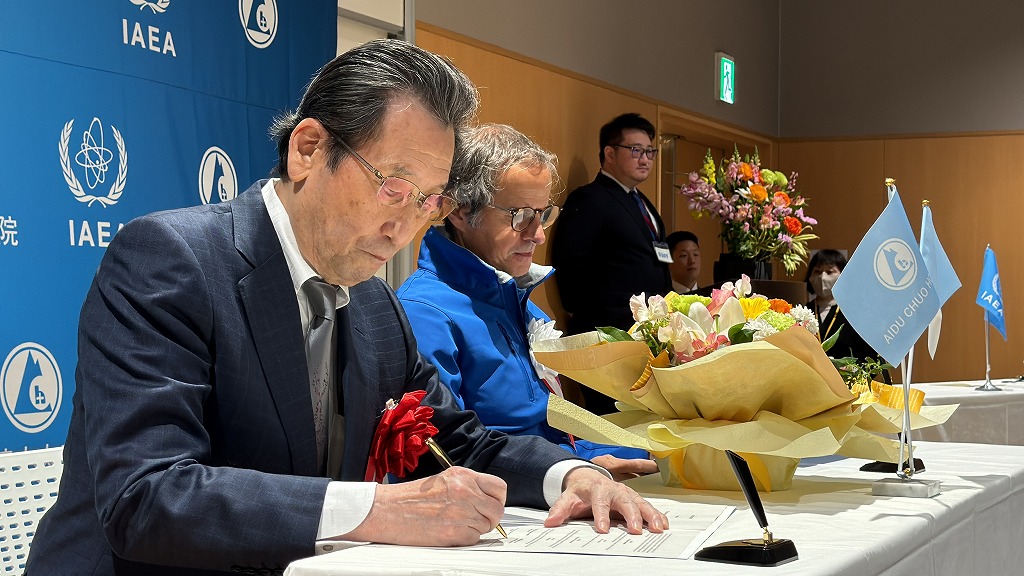
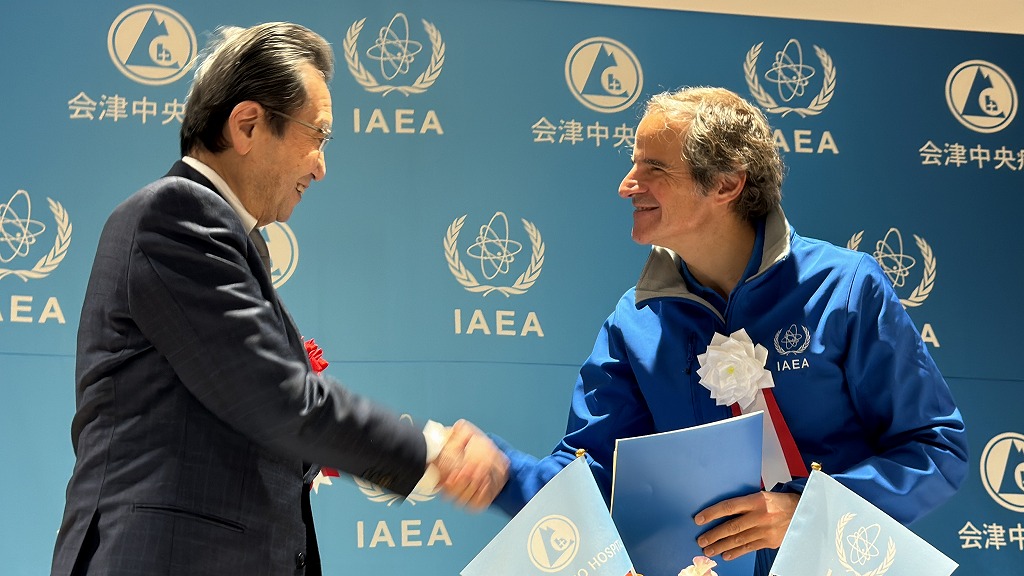
IAEA Rays of Hopeとは
「Rays of Hope」は、がん治療における放射線医学の利用を促進し、世界中でがん治療のアクセス格差を縮小することを目的としています。特に、放射線治療の設備や専門知識が不足している低・中所得国を支援することに焦点を当てています。放射線治療、核医学、放射線診断技術の導入と拡大を通じて、がん治療の質と安全性の向上を目指しています。これには、放射線治療設備の提供、医療従事者のトレーニング、品質管理プロトコルの確立、安全基準の強化などが含まれます。
Rays of Hopeのwebサイトはこちら
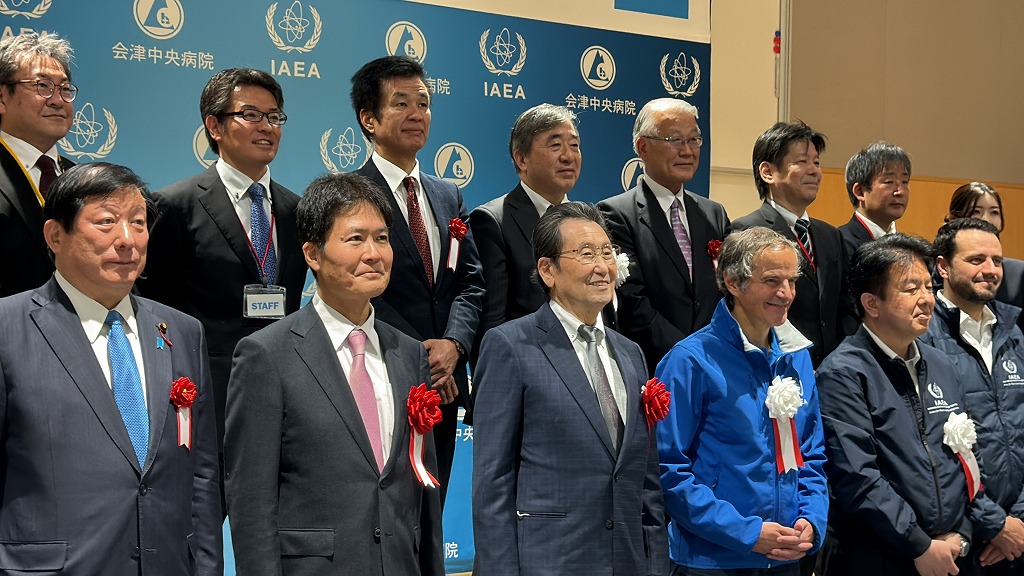
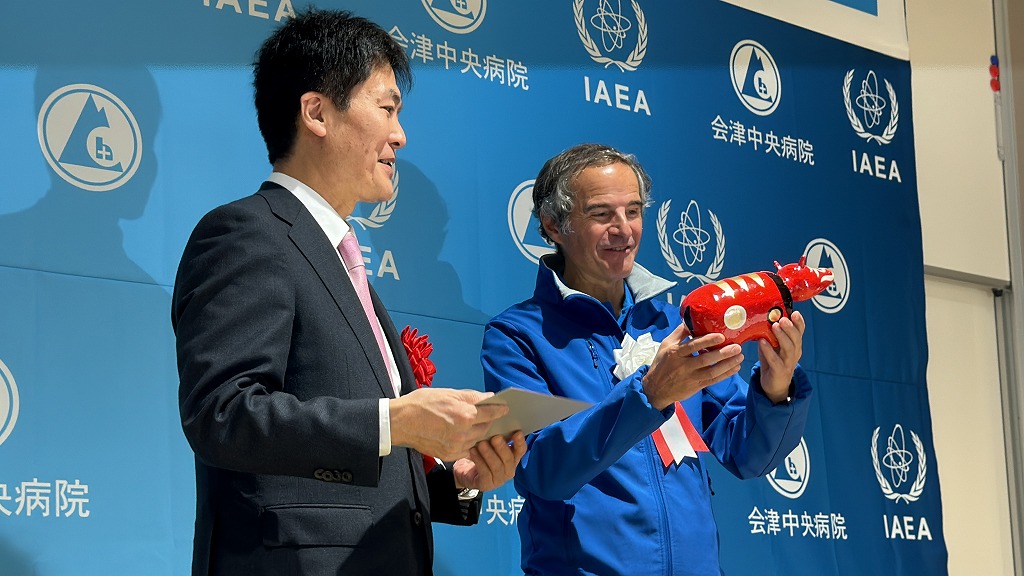
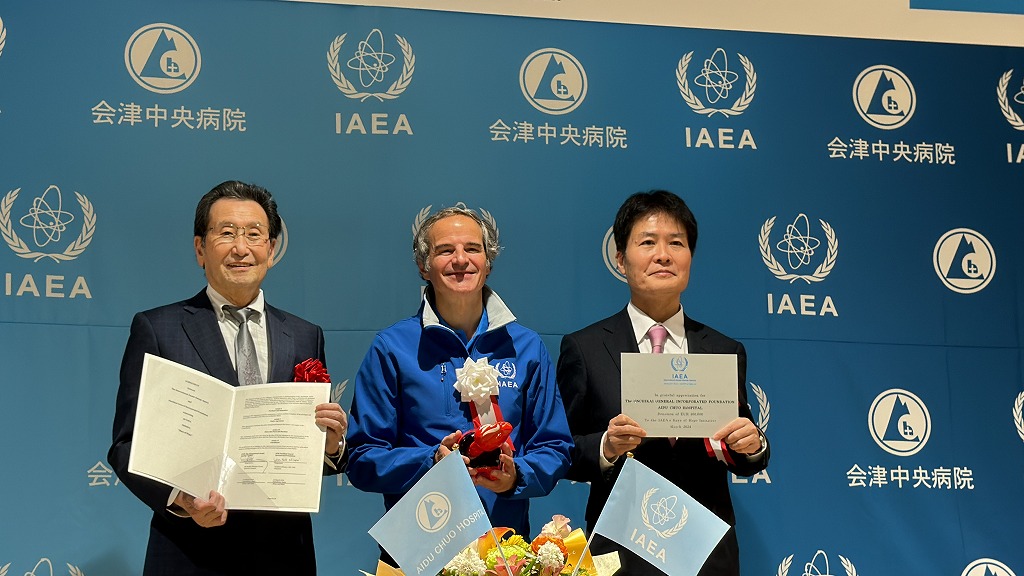
一般財団法人 温知会 会津中央病院は、国際原子力機関 IAEA Rays of Hope の活動と日本での福島第一原発事故後の放射線安全に対する様々なIAEAの活動に感謝し、IAEA Rays of Hope に対し10万ユーロ(約1,620 万円)の寄付を決定した。
Speech at the Ceremony
Good morning everyone. My name is Keiichiro Maeda and I am the director of Aizu Chuou Hospital. I would like to offer my greetings on behalf of our hospital, and to explain the reasons of our donation to IAEA Rays of Hope.
As you know, after the East Japan great earthquake in 2011, electric system of Fukushima nuclear power plant broke down and a core meltdown was caused. Subsequently, significant radiation damage occurred to the environment, and Japan is now still struggling with this problem. One of the difficulties was how to deal with a huge amount of water used to cool down the plants reactors because the storage space was insufficient. To solve this problem, IAEA provided a lot of technical and human support for the release of radioactivity contaminated water into the ocean, and examined the effects of this action to human health and the environment. The data exhibited by IAEA concerning safety of this procedure was fair and transparent, and Japan could restart the export of agricultural and sea products of Fukushima to world countries.
By the way, Aizu Chuou Hospital is a core hospital in Aizu area of Fukushima prefecture, and we are making efforts to provide high-quality, advanced medical care. The hospital has about 700 licensed beds including an emergency center, a stroke center, a cardiovascular center, a gastrointestinal disease center, and a trauma reconstruction center. Two years ago, our hospital also established a comprehensive cancer center to provide patient-friendly treatment. For this purpose, we offer less-invasive surgery including robot and endoscopic surgeries, comfortable chemotherapy rooms, and cutting-edge radiation therapy such as IMRT, which allows intensive radiation to the tumors.
Radiation therapy is less invasive than surgery, and its importance is increasing. Recently it is selected as an initial treatment option instead of surgery in some cases. Furthermore, it is also important to relieve pains for incurable cancer patients. However, the high cost is a burden for hospitals in developing countries to install the radiation therapy system, and staff education needs much money. Therefore, IAEA gives financial support to promote radiation therapy in low-income countries.
We donate 100,000 euros to IAEA Rays of Hope for following two reasons. Firstly, we appreciate the IAEA’s support to recovery from the nuclear disaster in Fukushima Prefecture. Secondly, we empathize the IAEA’s efforts to popularize radiotherapy in low-income countries. We sincerely hope that our contribution will help advance the activity of Rays of Hope, and will lead to happiness of the world people. Our hospital will also continue to improve the quality of cancer therapy.
Finally, I am sincerely grateful to IAEA Director Grossi and other members for your help to Fukushima.
Thank you for your kind attention.
